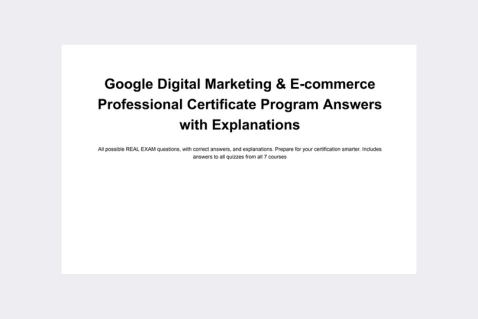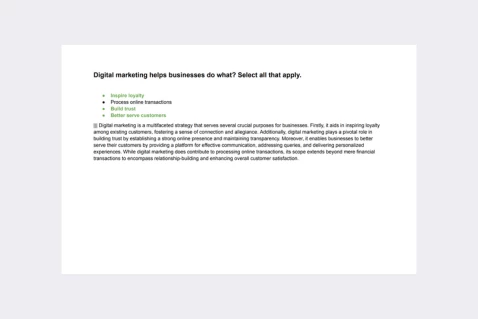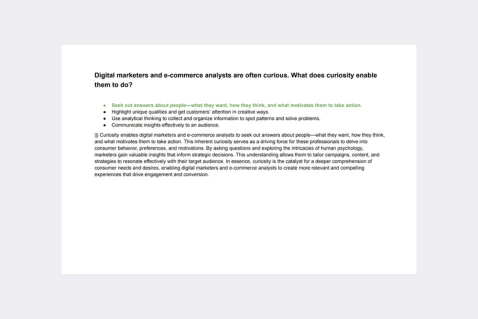As a digital marketer, you provide customers with a free branded t-shirt and magnet for a first-time purchase. This strategy falls under which marketing funnel stage?
Awareness
Loyalty
Consideration
Conversion
Certification program: 👉 Google Digital Marketing & E-commerce Professional Certificate (Coursera)
Explanation: Providing customers with a free branded t-shirt and magnet for a first-time purchase falls under the Loyalty stage of the marketing funnel. The Loyalty stage focuses on retaining existing customers, encouraging repeat business, and fostering brand advocacy. By offering incentives like free merchandise, a business aims to create a positive and memorable experience for customers, increasing the likelihood that they will continue to choose and support the brand. Loyalty strategies go beyond the initial conversion and aim to build long-term relationships with customers, turning them into brand advocates who not only make repeat purchases but also recommend the brand to others. This approach enhances customer retention and contributes to the overall success of the marketing funnel.
Passing exams is not a workout. Multiple attempts won’t make you stronger.



- All possible certificate program questions
- Real certification exam questions
- Detailed answer explanations.
- Over 1700 questions, 7 courses, 30 quizzes
- Free lifetime updates.
Leveraging Promotional Offers: Driving Conversions and Loyalty in the Marketing Funnel
In the dynamic world of digital marketing, capturing the attention of potential customers and guiding them through the marketing funnel requires creativity, strategy, and a deep understanding of consumer behavior. One effective tactic for driving conversions and fostering brand loyalty is offering promotional incentives, such as free branded merchandise, to encourage first-time purchases. But where does this strategy fit into the marketing funnel, and how can digital marketers leverage it to their advantage? Let’s explore.
Understanding the Marketing Funnel
The marketing funnel represents the stages that a potential customer goes through before making a purchase. These stages typically include:
- Awareness: Customers become aware of your brand, product, or service.
- Interest: Customers express interest in your offerings and seek more information.
- Consideration: Customers evaluate your offerings and compare them to alternatives.
- Conversion: Customers make a purchase or complete a desired action.
- Retention: Customers become repeat buyers and advocate for your brand.
The Role of Promotional Offers
Offering promotional incentives, such as free branded merchandise, primarily aligns with the conversion stage of the marketing funnel. At this stage, potential customers have already expressed interest in your offerings and are considering making a purchase. By providing additional value through promotional offers, you can incentivize them to take the final step and complete a purchase, thereby driving conversions.
Practical Insights for Offering Promotional Incentives
To effectively leverage promotional offers to drive conversions and foster brand loyalty, consider the following practical insights:
-
Understand Your Audience: Tailor your promotional offers to the preferences and needs of your target audience. Conduct market research to gain insights into their demographics, interests, and purchasing behavior, and customize your offers accordingly.
-
Create Compelling Offers: Develop attractive and compelling promotional offers that provide tangible value to customers. Consider offering freebies such as branded merchandise, discounts, free shipping, or exclusive deals to incentivize first-time purchases and differentiate your brand from competitors.
-
Promote Your Offers Strategically: Utilize various marketing channels, such as email marketing, social media, paid advertising, and website banners, to promote your promotional offers effectively. Craft engaging and persuasive messaging that highlights the benefits of your offers and encourages action from potential customers.
-
Set Clear Terms and Conditions: Clearly communicate the terms and conditions of your promotional offers to avoid confusion and disappointment among customers. Specify any eligibility criteria, expiration dates, and redemption instructions upfront to ensure a smooth and positive experience for customers.
-
Follow Up with Remarketing: Implement remarketing strategies to re-engage customers who have shown interest but have not yet completed a purchase. Use personalized messaging and targeted offers to remind them of your promotional incentives and encourage them to convert.
Driving Conversions and Loyalty
In conclusion, offering promotional incentives, such as free branded merchandise, is a powerful strategy for driving conversions and fostering brand loyalty in the marketing funnel. By providing additional value to customers at the conversion stage, digital marketers can incentivize first-time purchases, increase customer satisfaction, and lay the foundation for long-term relationships with their brand.
Remember, in the competitive landscape of digital marketing, offering compelling promotional incentives can make all the difference in converting potential customers into loyal advocates for your brand. So, leverage the power of promotional offers strategically to drive conversions and foster brand loyalty effectively.
Discover our best-value guides
- Special Bundle Offer Google_Ads_Roll
- Special Bundle Offer HubSpot_Exams_Roll
- Special Offer Unchained_Guru_Roll
- Special Bundle Offer Amazon_Roll
- Special Bundle Offer Google_Analytics_Roll
- Special Bundle Offer Google_SkillShop_Roll
- Special Bundle Offer Marketing_Platforms_Roll
- Special Bundle Offer Microsoft_Advertising_Roll
- Special Bundle Offer YouTube_Roll
- Special Bundle Offer Google_Android_Roll
- Ultimate PMP certification preperation guide
- Google Cloud Professional Architect Certification Exam Answers - Ultimate Guide
- Special Bundle Offer SEMrush_Roll